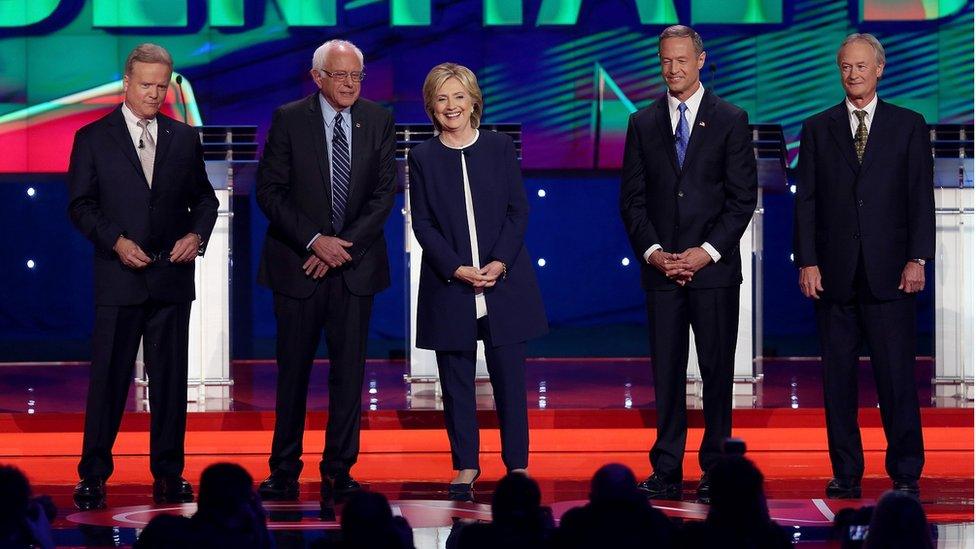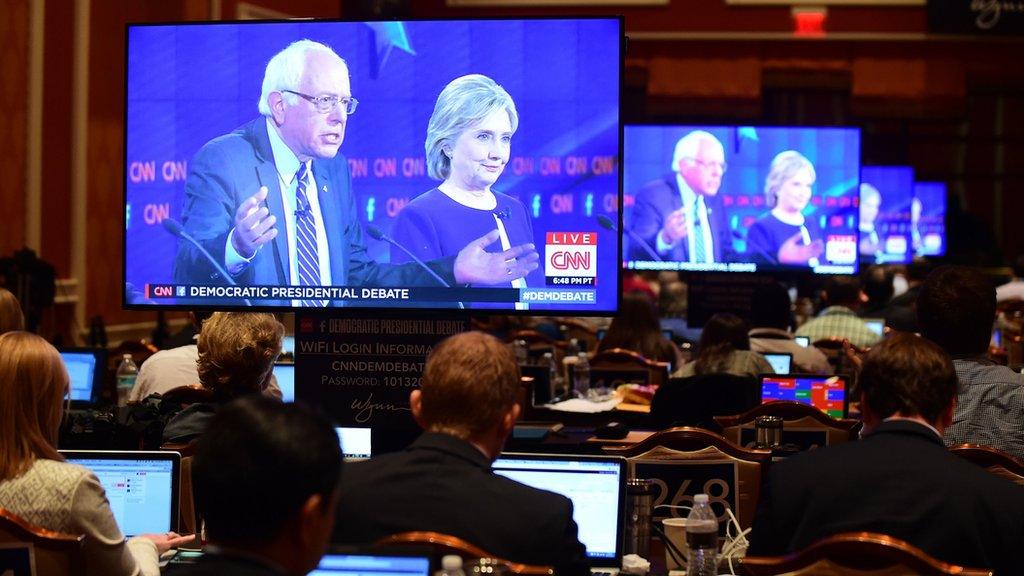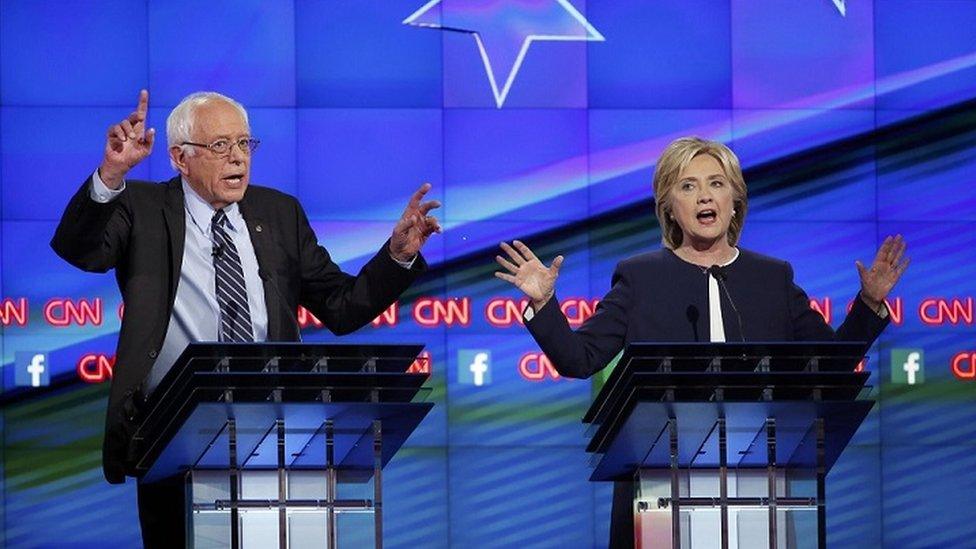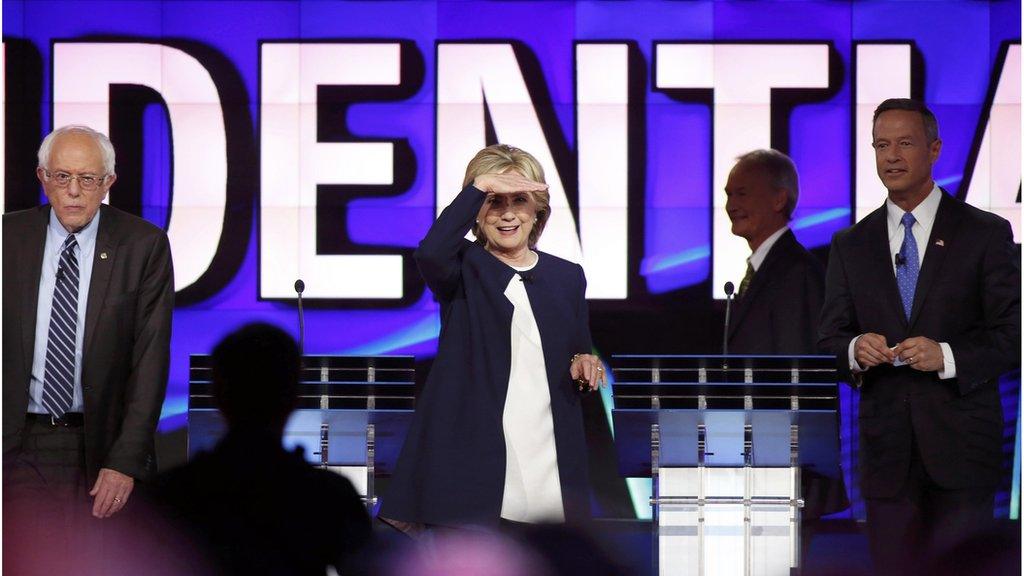A polished Clinton parries Sanders in Democratic debate
- Published
- comments

There may have been five candidates on the Democratic debate stage, but all eyes were on Hillary Clinton and her surprising challenger Bernie Sanders on Tuesday night.
The former secretary of state, a veteran of dozens of Democratic debates in 2008, was clearly the more polished of the two - and she had plenty of set-piece lines at the ready.
"I'm a progressive, but I'm a progressive who likes to get things done," she said early on, in a quote seemed tailor-made to deflect any attacks by a man who has found widespread support among the populist left.
For Mr Sanders, the impassioned rhetoric that plays well during his hour-long speeches to tens of thousands of cheering fans seemed somewhat out of place at times in the debate format. His strongest moment may have come in his opening statement, when he laid out the case against Wall Street and the "billionaire class".
As the debate ground on, a few key defining exchanges stood out for both candidates:

Gun control
Hillary Clinton says that Bernie Sanders is not tough enough on guns
Mr Sanders' righteous opening condemnations of income inequality and stagnant worker wages made his conciliatory position on gun control all the more apparent.
"We can raise our voices, but I come from a rural state, and the views on gun control in rural states are different than in urban states, whether we like it or not," he said.
It's the one area where Mrs Clinton is decisively running to the Vermont senator's left, and she was quick to argue the Vermont senator was "not at all" tough enough on guns and taking on the National Rifle Association.
"This has gone on too long, and it's time the entire country stood up against the NRA," she said to cheers.
Take-away: Mr Sanders stuck up for rural states, but will it fly with the majority of Democratic voters who live in urban areas?


Libya
Mrs Clinton's Republican opponents have hammered again and again on her perceived responsibility for the 2012 attack on the US consulate in Benghazi in which four Americans died, so one of the looming questions during the debate was how she would respond.
After a long discourse on the US military involvement in Libya, she answered with one line: "Unless you believe the United States should not send diplomats to any place that is dangerous, which I do not, then when we send them forth, there is always the potential for danger and risk."
Mr Sanders and the other candidates didn't press her, but it was an answer that could - and likely will - be characterised by a Republican opponent as indifference to the loss of American life.
Take-away: As a former secretary of state, foreign policy should be a strength for Mrs Clinton, but her answers reveal a continued vulnerability.

Emails
Bernie Sanders: "The American people are sick and tired of hearing about your... emails"
As expected, Mrs Clinton was also asked about the ongoing controversy over her use of a private email server during her time as secretary of state. While she admitted, once again, that she made a mistake, she was quick to pivot to an attack on Republicans and their congressional investigation, which she said was a "partisan vehicle" aimed at taking down her poll ratings.
"I am still standing," she said. "I am happy to be part of this debate."
Mr Sanders then chimed in with the line of the night - not to attack, but to come to Mrs Clinton's defence.
"The American people are sick and tired of hearing about your damn emails," he said, as Mrs Clinton reached over to shake his hand.
Mrs Clinton was flying so high at that point that, when asked whether she wanted to respond to Lincoln Chafee's questioning of her credibility, she offered a curt "no".
Take-away: Mrs Clinton couldn't have scripted it any better than that.

Taking on Wall Street

The threat of big business has been the central motivating issue for Mr Sanders' presidential campaign. Could Mrs Clinton steal a march on the Vermont senator and position herself as the candidate to take on corporate titans?
She certainly tried, and spoke about how, as a New York senator in 2007, she confronted Wall Street on their risky business practices and told them to "cut it out".
At that point, Mr Sanders, who describes himself as a democratic socialist, saw his opening and waited, with finger raised, to deliver his sharpest attack.
"In my view, Secretary Clinton, Congress does not regulate Wall Street, Wall Street regulates Congress," he said. "We have got to break off these banks. Going to them and saying, 'please do the right thing' is kind of naive."
Take-away: When it comes to populist economics in today's Democratic Party, Mr Sanders is sitting on the political high ground.

Flip-flops

"I never took a position on Keystone until I took a position on Keystone," Mrs Clinton said at one point when defending herself against the charge that she has changed positions on issues based on political expediency.
The clunkiness of the line was typical of Mrs Clinton's difficulty, at times, in dealing with charges that her views are based on politics and not principle.
Again and again, within the give and take of the debate, Mrs Clinton left herself vulnerable to attack. Her opponents were either unwilling (Mr Sanders and Martin O'Malley) or incapable (Jim Webb and Lincoln Chafee) of seizing the advantage.
Take-away: Mrs Clinton is a skilled debater, but she had her flaws. Whether it's rust or ongoing weakness, it's probably not enough to make Vice-President Joe Biden leap into the race.